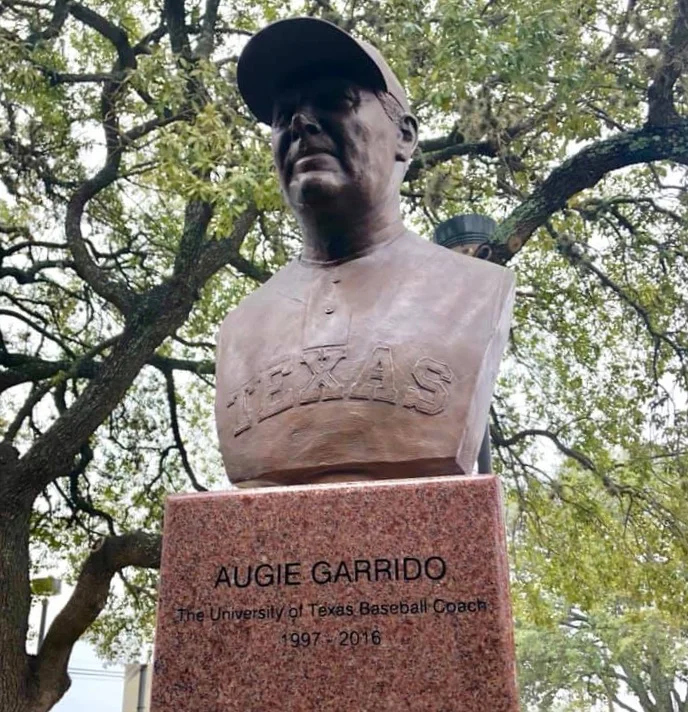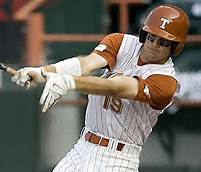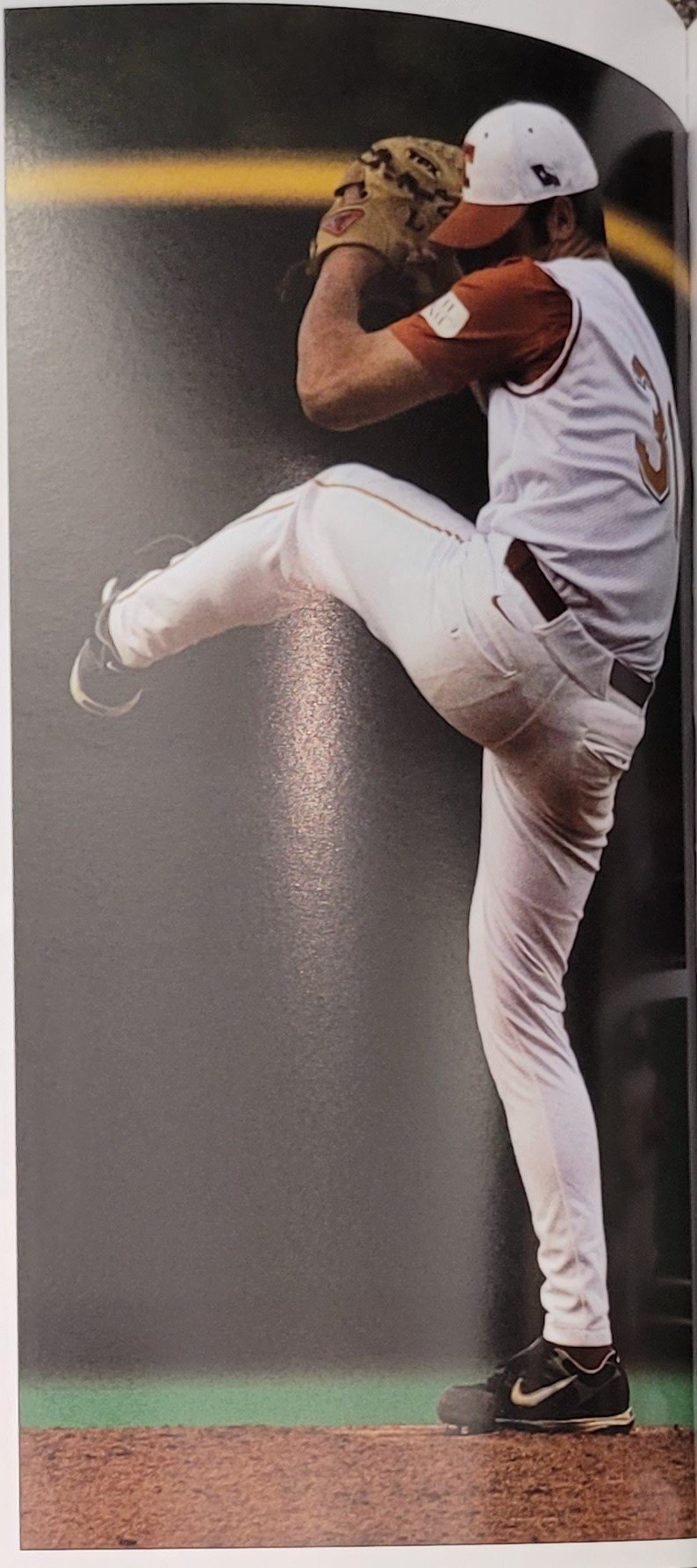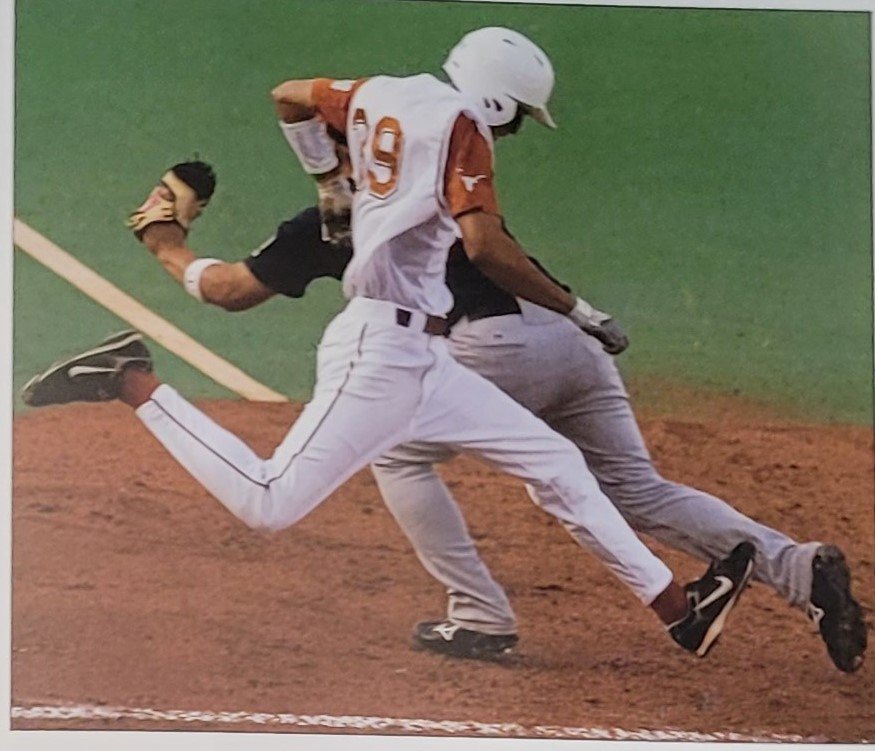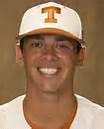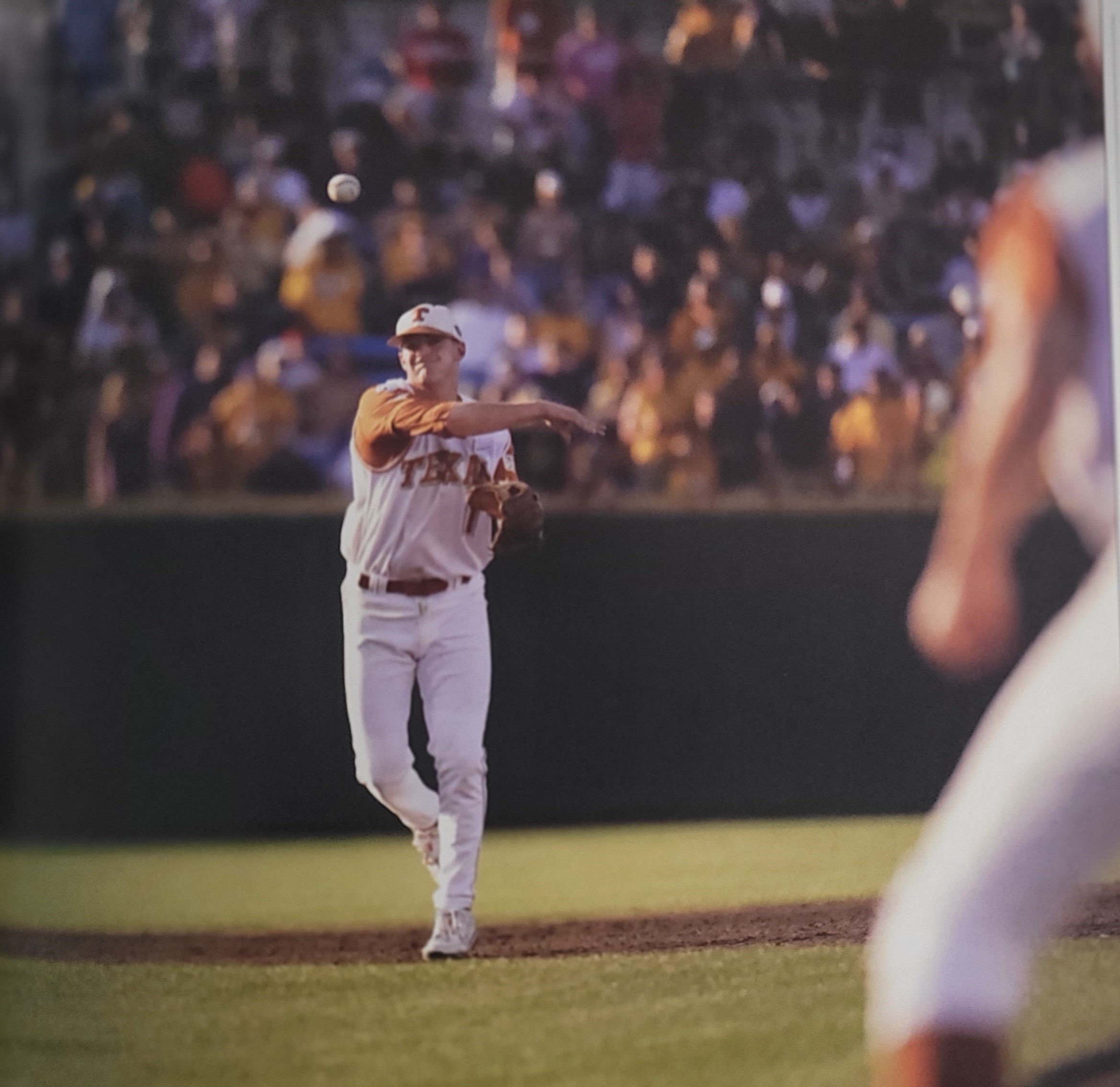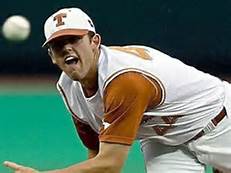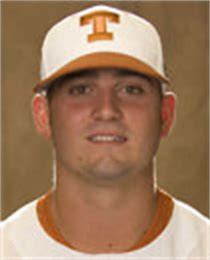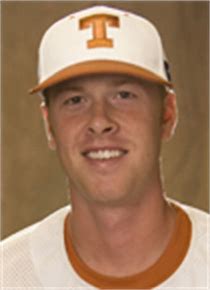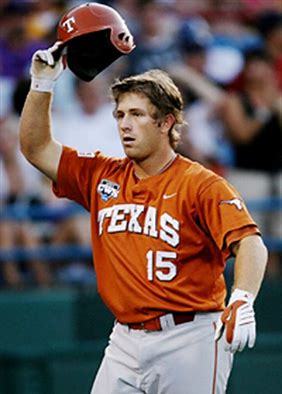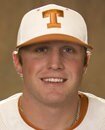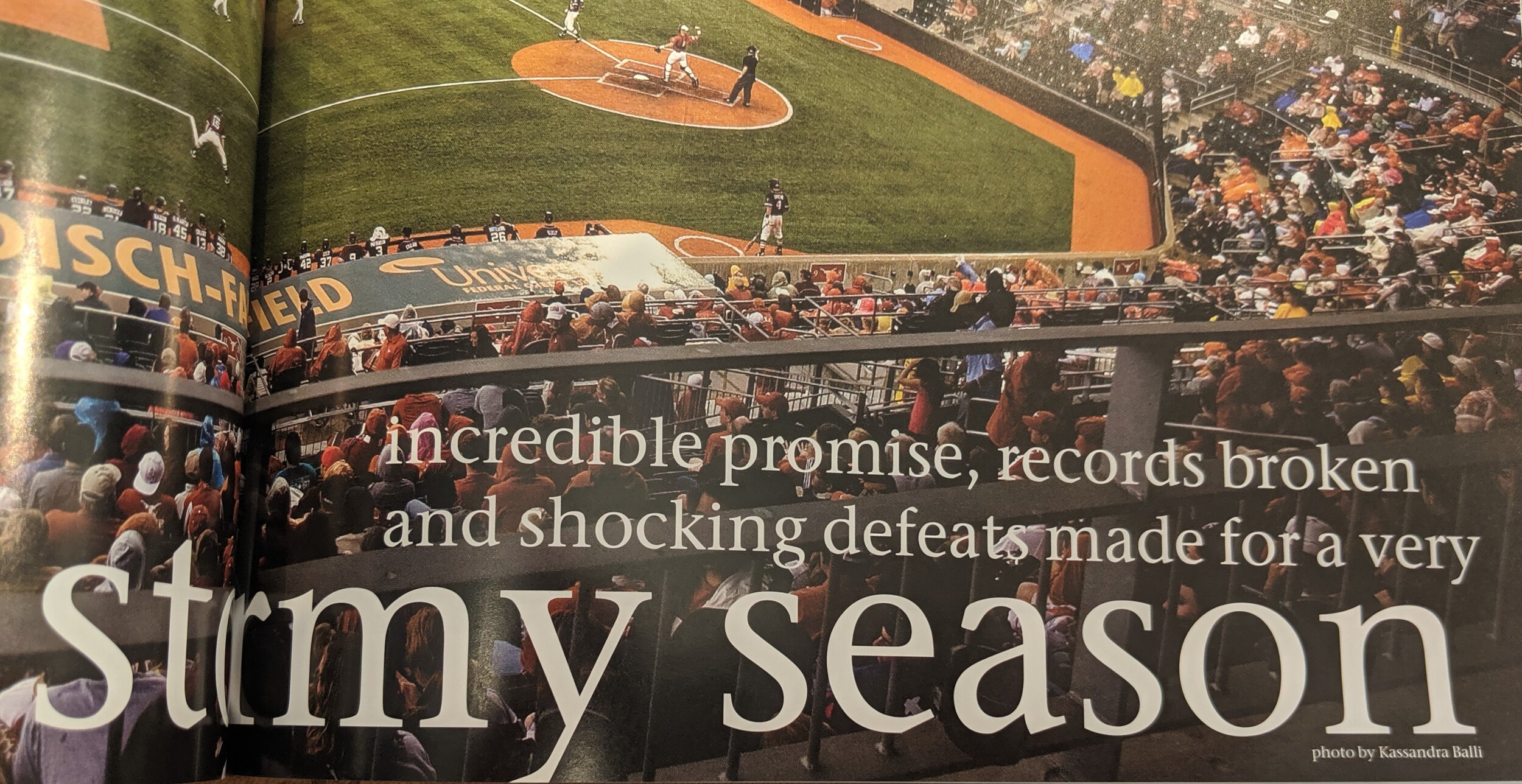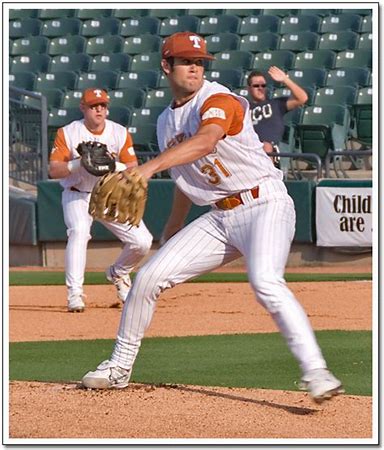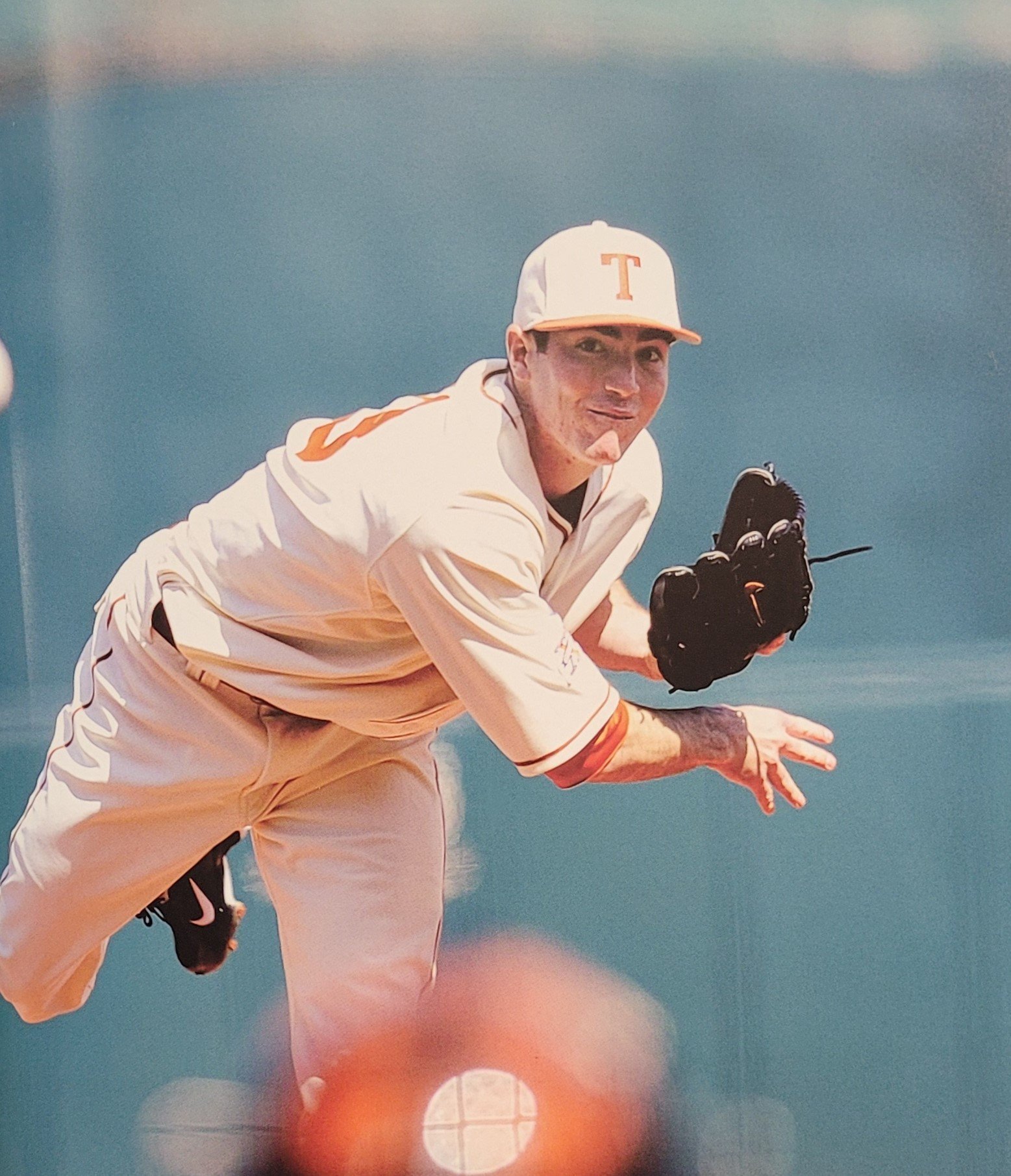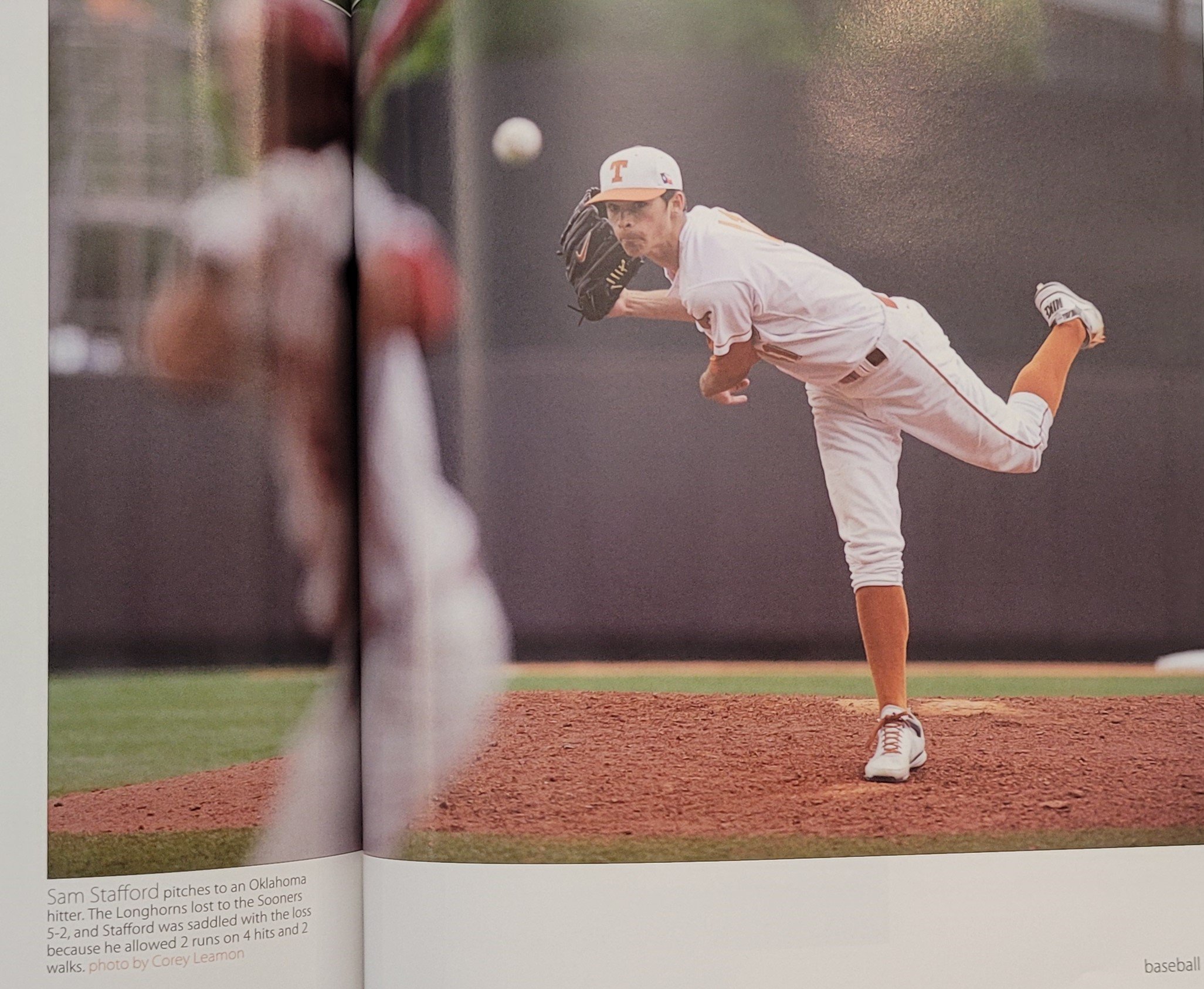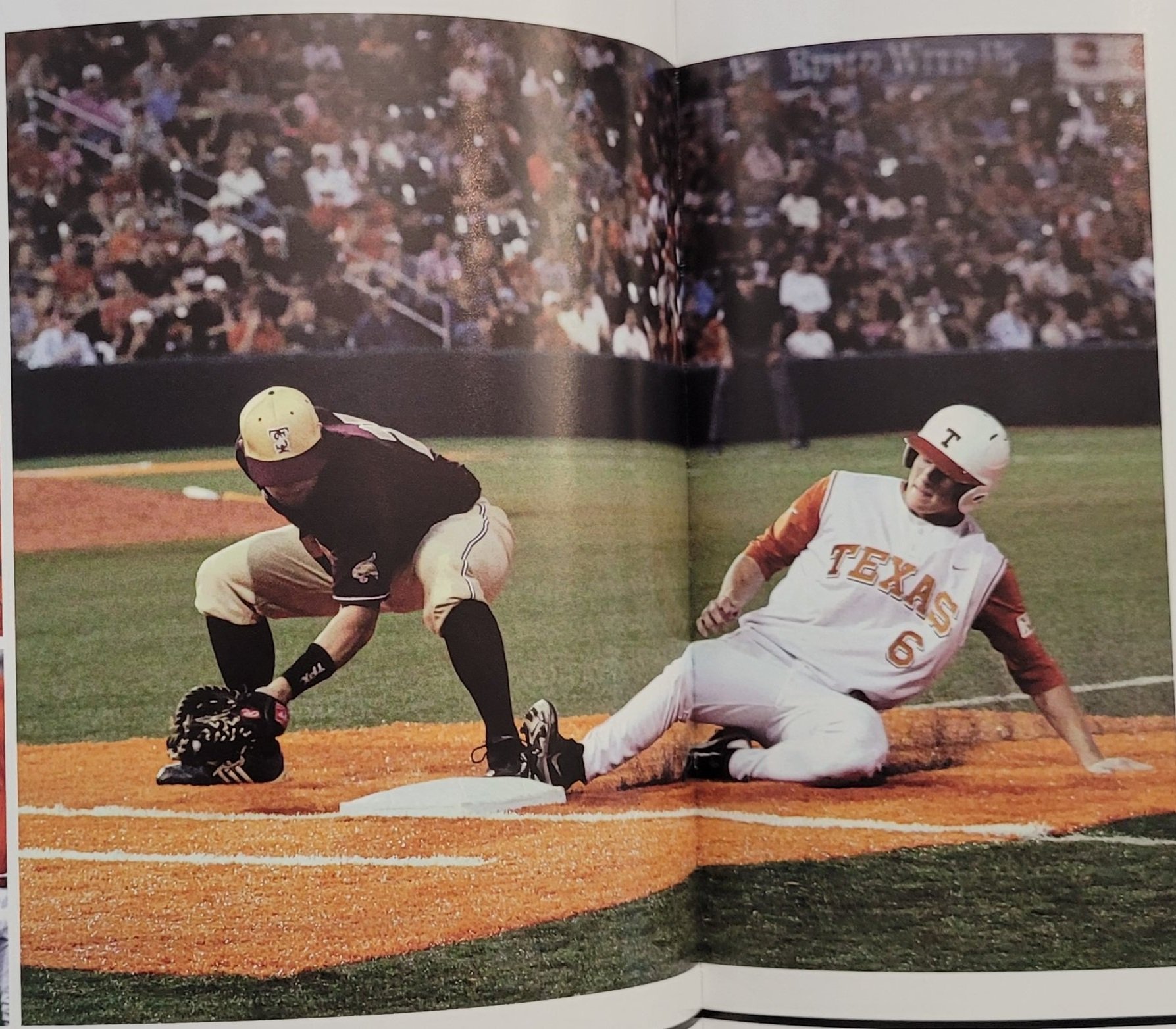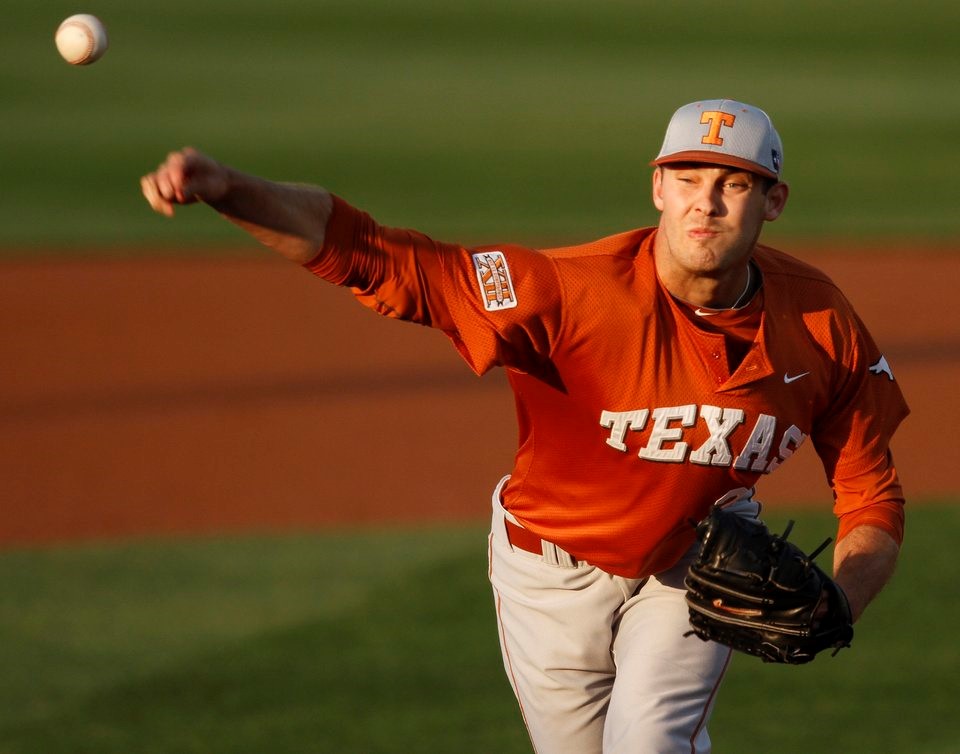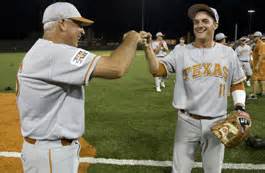2006-2007- 46-17
Twenty returning lettermen filled the roster. Randy Boone moves from a starting pitcher to a closer.
Kyle Russel is an All-American and GOLDEN SPIKES AWARD FINALISTS in 2007 and holds the career Texas record for home runs (57) and the season (28)
2007 -2008- 39-22
NCAA limits full baseball scholarships on a team to 11/7. The Longhorn traveling team consists of 25 student-athletes, so more than half of the team players are on partial scholarships.
The team was ranked 24th and 5th in the Big 12. Infielder Michael Torres set some UT records, hitting safely in 25 straight game hits. Chase Ruffin dominated opposing teams with an ERA of 1.94. Kenn Kasparek pitched the 20th no-hitter in school history. Jordan Danks led the team in runs, doubles, triples, and total bases earned. 8 players made the academic All-Big 12 list.
Kyle Russell in his at work uniform
The Horns started slow but finished as the conference champion. Going into the Big 12 tournament the baseball team was 24th in the country and 5th in the Big 12. Michael Torres set a 25-game hitting record. Chance Ruffin was named Big 12 Freshman of the year. Kenn Kaspared pitched his 20th no-hitter in school history and was Louisville Slugger’s National pitcher of the week .
Jordan Danks led the team in runs, doubles, triples, and total bases earned. 8 Longhorns were academic All-Big 12. Texas was invited back to the 2008 College world series.
Jordan Danks,
His parents are John and Renee Danks. Senior John Danks played basketball for the Horns from 1976-80. Jordan has an older brother, John, and a younger sister, Emily. John Junior, in 2003, was selected in the first round of the baseball draft.
Jordan took a different route to the pros by choosing college first. As a Texas Longhorn, he is the holder of many team seasonal records. He was selected to the national team.
Jordan Danks father as a Longhorn in 1977.
In 2008, Garrido was inducted into the Longhorn Hall of Honor,
Michael Torres sets a game-hitting streak record of 25 games.
Brad Suttle is an Academic All American
The magical 2008-2009 team - Runner up in the CWS but a champion in the hearts of fans with a 50-16-1 record
Horns won the 4th consecutive Big 12 championship. Texas was the top seed in the NCAA tournament.
Started the season with 11 wins. The Horns won their 4th consecutive Big 12 Championship. Texas was the top seed in the NCAA tournament losing to LSU in the finals.
A team that started as the Bad News Bears (not a compliment) morphed to what Augie says is his best "small ball" team ever. Every member of the starting lineup had at least 6 sacrifice bunts. The players were unified in the strategy needed to win. The 2009 team’s success confounded sportswriters. It was a team that did not win with averages and percentages but with a spiritual bond and a sense of destiny. The team ranked 210th in home runs with a batting average next to last in the Big 12. This team only won the conference championship because the opposing team had a plane to catch. Augie says with humor that the Longhorns had discovered divine intervention from the "Church of Baseball. "This team did what they needed to do to win- "walk, sacrifice, homers, small ball, long ball, bunts, balks, and acts of nature" A team that was "offensively challenge" was winning on "pitching and magic" This team should be presented with the record for most "improbable wins."
Austin Woods breaks Harvie Haddix’s record by throwing 13 perfect innings against Boston College but did not win to show for his effort. Wood left the game in the 20th inning after his 169th pitch.
May 30, 2009, Boston College and UT played the longest game in college baseball history. The game lasted 25 innings and 7 hours and 3 minutes. Austin Wood threw 13 scoreless innings in relief, and the opposing team players stood and clapped for his performance.
Augie says that Travis Tucker is one of the best hitters and a true leader for the 2009 team. According to Coach Keith Shinaberry, Travis was a free spirit and a natural leader. Travis suggested to coach Garrido that his coaching style was too complicated and asked Coach to keep the game simpler. Coach Garrido did as instructed, and the team started to win.
Russell Moldenhauer is benched early in the season because of a batting slump and an injury. He is then promoted to clean-up hitter during the CWS game against Southern Miss. He delivers 4 home runs during the CWS. Augie said this team of 2009 " not only defied explanations, but they also defied natural law."
Even though this team finished runner-up, Coach Garrido knew this team would receive more adulation than most teams who lose. The Horn fans treated this team as the greatest non-champion of all time.
Bill Little said this team was loved because of "who they became and the fact that they took us all along for the ride." "They were totally human and absolutely fun" to watch.
Bill Little commentary: NCAA Regional chronicles -- Last man standing June 1, 2009
Bill Little, Texas Media Relations
It is hard, if not darn near impossible, to be all alone in a crowd.
And yet there Preston Clark stood, watching with the rest of the baseball world in Austin, as his line drive to left field battled to defy nature, to somehow best a 25 mile per hour wind that seemed determined to blow it foul.
Close to 14,000 eyes were watching the ball, including those of the three Texas runners on base who had somehow produced a 10-10 tie out of a four-run deficit heading into the ninth inning of the NCAA's Austin Regional Championship game against Army.
Frozen just a few feet from home plate, locked in his dreams, was Preston Clark.
The road for the senior from Rockwall had been as tough as it has been for any Longhorn ever. He had come to Texas as a highly touted catching prospect in 2005, the heir-apparent to Taylor Teagarden, the Longhorns' all-American catcher who would be spending time in the Big Leagues in just three years. He is the only remaining Longhorn who was a member of that 2005 National Championship team. He has pride in being a member of that team, but doesn't take ownership of the title, since he wasn't on the suit up squad for the CWS. His National Championship ring, with all of its glitter, is put safely away.
Two shoulder surgeries, a costly knee injury just before the regional in 2007 and more work and rehabilitation coming into this year had relegated him to utility work, and a lot of bench time. And yet at Oklahoma City in the Big 12 Tournament, he had homered. The long missing stroke with the bat was back. Still, with sophomore Cameron Rupp playing well behind the plate, Preston was searching for a place in the lineup.
The guy once heralded as a "can't miss" super star even moved quietly into the 2009 Austin Regional, inserted in the lineup in the Longhorns' opening game against Army as the designated hitter-a right-handed batter in the fifth spot of the lineup against a left-handed pitcher. But-and you have heard this before-playoffs do make strange heroes, and Preston Clark's regional run was only beginning.
First, Brandon Belt was hit by a pitch, knocking the Longhorn first baseman out of the game in the first inning. So Clark, the designated hitter, moved to first base, where he played superb defensively, while collecting two hits and scoring two runs. In the 25-inning game against Boston College, he started at first base, had four hits and scored one of the runs in Texas's 3-2 victory.
From the beginning of the tournament, Army coach Joe Sottolano had warned that his team, which batted .334 over a 53 game regular season-could hit. He also made it very clear. Army had not come to the NCAA Regional as a fourth seed with expectations of a nice visit to Austin and a box of "you were here" medals.
"It is not our nature," he had said, and his steel eyes and those of his players made you know he meant what he said.
Augie Garrido has often said that baseball is a game of the unexpected, and this 2009 Austin Regional proved to be that for many of the so-called analysts who at one point called it the easiest of the 16 regionals. It was, without question, the best balanced, and the most competitive, of all of the many regionals held in Austin since the first was held at what was then Disch-Falk Field in the summer of 1979. Any of the four teams could have won it. Texas State went out first, suffering two late losses to Boston College, 8-7, and Army, 7-4.
Boston College had rallied to beat the Bobcats, and then became part of that 25-inning game in a 3-2 loss to Texas. The tournament ended in heartbreak for Coach Mik Aoki's Eagles in a 4-3 loss to Army, with the tying run at third base and heading home when the first base umpire rang out the BC runner on a double play-and video replays showed the runner was safe.
No team, however, has ever visited an Austin Regional and commanded more respect and captured more hearts than did the Black Knights of the Hudson. Garrido would say at the end of the day that baseball was "spiritual." Perhaps so, because there was a unique spirit in the entire tournament. This was a four-team field of really good college baseball teams in which there were no bad guys. At the end of the BC-Texas marathon, the teams embraced. At the end of the tournament, the UFCU-Disch Falk Field crowd gave one of its best applauses ever to the men of Army.
Most times, the team that comes out of the afternoon game in a four-team regional will come into the evening session and run out of gas about the sixth inning. But not Army. It was not, as their coach had said, "in their nature." The Black Knights pounded Texas starter Taylor Jungmann for six earned runs and chased him from the game after three and a third innings. When Kevin Keyes ignited the 'Horns and the crowd with a two run homer to cut Army's lead to 7-6 in the seventh inning, it appeared the momentum had swung. Instead, Army swung. A two run home run by stellar sophomore shortstop Clint Moore and booming shot over the centerfield "Green Monster" by 6-7, 250 pound Joey Henshaw (he, too is a sophomore) gave Army a 10-6 lead with only two innings remaining in what was now being viewed as the region's "first Championship Game." If Army won, the two would play again on Monday.
The focus of the weekend, to that point for Texas, had been the dramatics of the Saturday night winner's bracket game with Boston College. The two teams had played more innings (25) and for a longer time (just over seven hours) than anybody in NCAA history. Texas closer Austin Wood had achieved immortality in Longhorn lore by pitching 13 innings in relief, including more than 12 before yielding a hit. He was matched on the other side by Boston College reliever Mike Belfiore, who shut out Texas for nine and two thirds innings himself.
Mack Brown has a saying when qualifying something that is really good, and it's "I won't say it is the best, but I will say no one has anything better."
So it was with Wood's truly remarkable performance. He threw 169 pitches and basically pitched more than 12 innings of no-hit baseball. Old timers at Texas will tell you how Bobby Layne pitched a no-hitter at Texas A&M to claim the Southwest Conference title while nursing a cut foot and a dozen cold beers. The "gold standard" for Texas pitching masterpieces prior to Saturday night was thrown by Burt Hooton during his junior season in an SWC showdown against Texas Tech. Hooton, who was credited with a no-hitter by pitching a perfect game over the regularly schedule contest, defeated the Raiders' Reuben Garcia, 1-0, in a 13-inning game many claim was the best pitched game ever in the SWC. Hooton didn't walk a batter, wound up allowing one hit (the batter was retired on a double play), struck out 19, and faced the minimum 39 batters.
Now, here on a surprisingly still late May Saturday night, Austin Wood matched Hooton's 13 innings, but he did it all in relief. And what sets this one apart is that he did it in a game of sudden death. From the bottom of the ninth inning until he was replaced by Austin Dicharry in the 20th inning, Wood played Russian roulette with Boston College's bullets. One run, however it came, and it was over. And as the evening wore to morning, both teams realized that the goal of winning the regional was getting dimmer and dimmer for the team which finally lost the contest.
Mik Aoki knew it, even as he regrouped his club for the game against Army which began less than eleven hours after the 25-inning game was over. Still, the Eagles were in the game with the Cadets to the very last second.
When the final press conference was over, Joe Sottolano's voice almost broke as he talked about his team. The Black Knights had taken an early lead over Texas, and dominated the game until the fateful ninth inning. Keyes had provided the big blow, but time after time, the Longhorns were thwarted by good pitching and outstanding defense. Moore, the young shortstop, made an unbelievable play to throw out Travis Tucker from deep in the hole. Andy Ernesto's diving catch had taken runs and an extra base hit away in centerfield, and Kyle Fleming went to the right field wall to haul in Brandon Belt's bases loaded blast that ended the sixth inning.
"When we came here," Sottolano said, "our team has been given courtesy and respect because of the name on the front of our jerseys." He looked over at Moore, and Ernesto-a senior who will be leaving to become a helicopter pilot-and said softly, "what I would like them to be remembered for is being very good baseball players."
Preston Clark stood at home plate, awash in the dream of every player who ever picked up a bat or threw a ball. It is that moment of the spirit, when time stops, and the world is in freeze frame. Folks down the left side of the ball park looked at the third base umpire, who thrust his arm toward the field. Preston Clark raised his hands, and started to first base.
"When," they asked Joe Sottolano, "did you believe your team was in trouble?"
"When the grand slam happened," he said. "Until then, we have enough confidence in ourselves and in our team to believe we had a chance. It is not in our nature to do anything else."
What happened at UFCU Disch-Falk Field Saturday night and early Sunday morning was historical. The record will show it was the longest game in school history, and in NCAA history. Individual records were set, and they will all be dutifully recorded in the annals of time.
But what happened on Sunday night and throughout the tournament was memorable. It is the essence of sport that you remember the moment. It is then that iPhones and digital cameras give way to the pictures that hang on the hallways of the chambers of the mind. Because the wonders of technology are proven and true, but they can never capture one thing: A feeling.
That is the pride Joe Sottolano felt as he looked the young men he had recruited to come play baseball and become American soldiers at The United States Military Academy, a similar kind of pride that Augie Garrido has felt in watching young men grow, year after year as the winningest coach in the history of the game.
Most of all, it is about Preston Clark, and all those like him who have battled adversity.
It is, once again, about waking up knowing who you are, and going out and realizing who you can be. And that is the best dream of all.
2010- 50-13
Top of the chart
After a great regular season with a 46-8 record, Texas had a poor showing in the Big 12 tournament, followed by an outstanding performance at the NCAA regional championship, but lost to TCU in the super regional tournament.
Workman
This Team Holds The Record For most home runs (81) and most strikeouts (482).
Garrido says this team had the "best and deepest pitching corps we've ever been blessed to coach.” So deep that they had to ask Chance Ruffin, who was in the starting pitching rotation in 2009 with a 10-2 record, to act as the "closer" in 2010. His father was also a Longhorn on the 1983 National Championship team.
2011- 49-19
The all-time attendance record is set with 273,029 fans attending home games.
This team holds the Longhorn record for highest fielding percentage(.982), and most saves (23)
2012- 30-22 pending
Garrido says “ Any time a pitcher sits on the bench and watches the offense score runs, he feels a lot more confident, and he doesn’t feel like if he gives up one run, then he’s going to lose the game.” “When they go out there thinking they can’t give up a run is when they overpitch, walk guys, and get out of rhythm.
2013 pending
Garrido is inducted into the Omaha College Baseball Hall of Fame.
Texas is ranked 8th at the start of the season. Catcher Hoby Milner and Kendal Carillo know how to throw strikes and lead the team with command of their pitches.
2014- Coach Garrido: record 46–21 (13–11 Big 12)
The attendance records are broken for a two-game series (14,846) against Houston and a three-game series (19,727) against TCU.
06.23.2014 | Bill Little Commentary
Bill Little Commentary: The return of the Horns
As the final curtain came down for 2014, Texas Baseball, eliminated from the CWS in the championship game of what was called "bracket one," it wasn't about what they had lost. Instead, it was about what they had won.
Bill Little, Texas Media Relations
As the media quizzed Garrido about the comparisons with the 1956 Longhorn team—the last time Texas had finished at the bottom, when the interview was over, he turned and then said, "let me ask a question.
Folks came to love this team for its spirit. It was never perfect, but it was perfect in its imperfection. Most of all, it had heart. From bullpen catchers such as Grant Martin and James Barton to the student managers and trainers, and staff, this became a team with a common purpose. More than winning itself, the purpose of team, togetherness, and an innate love of the game took priority.
It should not be lost that Garrido in the postgame press conference, said he thought that this 2014 team was the best Texas team since its 2005 National Champion. That is not to dismiss the 2009 runners-up or the 2010 team, which was knocked out as the nation's No. 1 seed in a Super Regional in Austin.
Garrido has said that the 10 days of the College World Series is a "life-changing experience." Because the purpose of a university is to educate, there are no greater life lessons than those learned in the competition arena. You understand working together; you understand that there are wins and losses, joys and pains, and with each lesson learned comes an opportunity to grow.
Augie Garrido Reflection Point
Coach Augie's Years at Cal State Fullerton, the commuter college as told by Kevin Costner
When Augie was hired at Cal State Fullerton, he had no scholarship to offer, no lights on the field, and no locker room. The players changed to baseball gear in the parking lot. The budget was $4000 and raised to $6000 when Cal moved to Division I. In his second season, the team made it to regionals, but Cal had no money, so he placed a second mortgage on his home to fund it.
Kevin Costner cast Augie as the NYY manager in the movie "For Love of the Game."
Augie Garrido- "Pressure is a choice."
Augie left a legacy of wins, laughter, and leadership. Mack Brown said, “He really made you think, made you laugh, and always was so much fun to be around....."
In his early years, Augie said, "I was driven to succeed by a fear of losing his job. He said that "only the best at anything are assured a job," and that is "what drove me — trying to be the best I could be, and I still am driven by that." Augie said, “When I did sign the two-year extension (after the 2014 season with Texas), I went up to the cemetery where my mom and dad are buried. I knocked on his tombstone and said, “Dad, when I finish this contract, I’ll be 79 years old. I think I kept my job.”
Professional Testimonies
Mike Martin, who coaches the Seminoles, said, “College baseball and the world lost one of the finest men in our coaching profession,” “Augie dedicated his life to making young men better people. He will be deeply missed by myself and many others.”
Rick Barnes said, " I loved him more as a man than I did as a baseball coach. We lost truly a beautiful personality......." When Coach Barnes struggled with his team, Augie helped Coach Barnes with perspective-needed personal focus and dealing with pressure. Coach Garrido told Barnes that after winning the National Championship at Fullerton, the "... next year, he put so much pressure on his team" that his mom got involved. She had a picture and said, "you notice when your guys won the championship, you're holding the trophy. Why don't you let the kids hold it." Augie said, "'I realized that day that it really is not about me." The true key to success in college coaching is " can you get your guys to play like little boys that love the game.'" In 2009 he reflected on his change in attitude by saying, "I am a teacher by nature, but I am no better or more important than the kindergarten teacher or the high school coach."
Shaka Smart said, "Augie was a mentor of mine during my first couple years at Texas....." "I knew Augie really well. He took me under his wing when I first got to Texas. He came over to practice. A lot of people don't know this, but Augie is a basketball guy. Augie played basketball. That was kind of his first love."
Rice coach Wayne Graham said: “It is a sad time because I don’t think anyone did more for college baseball and baseball in general than Augie Garrido. He knew the particulars of the game better than anyone.”
He cultivated Oregon head coach George Horton, who has won more than 1,000 games, Fullerton head coach Rick Vanderhook, and Skip Johnson at Oklahoma. As assistant coaches, he influenced Arizona recruiting coordinator Sergio Brown and Stanford’s Tommy Nicholson.
He was even friends with Kevin Costner and played "For Love of the Game" as the Yankees manager. Garrido was also the subject of Richard Linklater’s ESPN documentary “Inning by Inning: Portrait of a Coach” and hosted “Home Plate with Augie Garrido,” a cooking show on the Longhorn Network.
Augie Garrido was a great teacher and shared his small-ball philosophy with anyone who would listen.
Garrido says in his biography he loves home runs, no-hitters, and spectacular fielding. Still, he knows that most games are won by “small ball”- getting ahead of the count, taking a walk, sacrifice bunting, making productive outs, and choosing the proper pitch for the proper moment.
Biggest Regret
The players I let down. The players that had lesser roles needed more from me, and I didn’t know it.
Coach Garrido's contributions to Longhorn traditions represent a portal to the past that reminds Longhorn fans that heritage shapes the present and empowers the future.
Augie quotes from his autobiography.
To self-correct, you have to self-assess.
Fears are feelings, not facts. You can refuse to give them power.
Parents of young kids mean well, but sometimes parents live vicariously thru their children and put undue pressure on them to succeed. The result too often is that the young men never develop the self-confidence and self-respect necessary to guide their own lives. " The worse thing parents can do is withdraw their love if the child doesn’t meet athletic expectations."
Augie wisely notes that as we grow into imperfect men ourselves, we appreciate our fathers even more because we better understand them and the challenges they faced.
It is important to play baseball like a kid caught up in the game.
”We will strive for perfection, but you will fail.” It takes courage to keep striving after you fail.
If you spend your life seeking approval or rewards from others- whether it is love or acceptance- you will never find the fulfillment that comes from accepting and loving yourself.
Stay in the Moment and focus on fundamentals.
Rather than following in our fathers’ footsteps, we chased their dreams.
We have found that most of the learning in both life and baseball occurs when there has been a failure.
In baseball and life, “homers get all the glory, but bunting is the essence “ of all.
We tend to accrue limits as we age, either because we put limitations on ourselves or we accept those placed upon us by others. People who can blast thru these limits are a rare breed.
02.24.2005 | Baseball
Head Coach Augie Garrido
Bill Little
Five trips to the College World Series (CWS) in the last six seasons. National Championships in both 2002 and 2005. Second and third-place national finishes in 2004 and 2003, respectively. Two Big 12 Conference Championships (2002 and 2004) and a pair of league tournament crowns (2002 and 2003). These are the results and the reasons why head coach Augie Garrido was hired to guide the Texas baseball program in 1996.
During his nine years in Austin, Garrido also become the all-time winningest coach in NCAA Division I baseball history by capturing his 1,428th career victory on June 9, 2003, (a 6-5 Texas win over then No. 1 Florida State during NCAA Super Regional action in Tallahassee, Fla.). Additionally, while he brought Texas back to the CWS for the first time since 1993 during the 2000 campaign, he then returned the Horns to the pinnacle of collegiate baseball in 2002 by leading UT to a 57-15 overall record that produced the school's first-ever Big 12 regular-season and tournament championships as well as its first national title since 1983. A mere three years later in 2005, he duplicated the feat by guiding the Longhorns to their sixth National Championship - the second-most for one school in NCAA history. Texas' rise under Garrido has been the culmination of inking nine straight top 15 recruiting classes and producing teams that have stood tall against perennial powers such as LSU, Miami (Fla.), Stanford and USC. Now, as he enters his 10th year in Austin, Garrido, who was selected as both the 2002 and 2005 National Coach of the Year, looks to keep the program in contention for college baseball's ultimate prize each and every season.
A legend in his own right, Garrido is one of only two coaches in Division I baseball history to tally 1,500 or more career victories. As if that were not impressive enough, Garrido is also the first coach to lead teams from two different schools to national crowns (Cal State Fullerton & Texas), guide squads to National Championships in four different decades, and is one of only three coaches in history to win five or more NCAA titles (1979, 1984, 1995, 2002, 2005). In fact, Garrido is the only coach in the modern era of NCAA football, baseball and men's or women's basketball to ever lead teams from two different schools to national crowns - only football legend Pop Warner accomplished such a feat by leading Pittsburgh (1916 & 1918) and Stanford (1926) to National Championships. Additionally, Garrido has earned 12 trips to the CWS after making 25 NCAA Regional Championship appearances, including seven at Texas, while garnering National Coach of the Year honors six times (1975, 1979, 1984, 1995, 2002, 2005), regional coach of the year accolades following seven different seasons (1975, 1979, 1984, 1995, 2002, 2004, 2005) and conference coach of the year distinctions on four occasions (1987, 1995, 2002, 2004), as he has led his clubs to 20 league crowns.
The Vallejo, Calif., native is just the 13th coach in UT's 111-year baseball history, and, with the exception of the war years of 1943-45 when Blair Cherry was at the helm, is only the fourth Texas head coach since 1911.
Despite his numerous accolades and honors, Garrido has not reached the peak of collegiate baseball with a "win at all costs" attitude. Instead, he has taken a slightly different approach to coaching the game of baseball.
Contrary to the myth that baseball is a game of strictly bats and balls, Garrido firmly believes that it is a thinking man's game. It is his claim that no corked bat or tainted ball has ever been as potent a weapon on the field of play as the mind of a knowledgeable ballplayer.
"I want my players to be aware of what is most valuable to them," Garrido said. "Is it a bat, a ball, a glove or the ability to use those things? Is that it? No. It's the players' minds and their ability to use them. That's what makes the use of a bat, a ball and a glove brilliant. It's my job to help players find balance in their lives. I want to help them help themselves become what they want to be through the fundamentals of baseball. Baseball is nothing more than another classroom in the educational process. Really, baseball is a metaphor for life."
As a result of his unique coaching style, Garrido has been ranked as one of the top three baseball teachers in the nation by Major League Baseball Directors of Player Development. To deserve that distinction, Garrido has coached three Golden Spikes Award winners, three National Players of the Year, six College World Series MVPs, 41 All-Americans, 127 All-League selections and 73 professional players over his career. He has also had 11 of his players selected in the first round of the Major League Baseball Amateur Draft, including Longhorns Beau Hale (No. 14 to Baltimore) in 2000, Omar Quintanilla (No. 33 to Oakland) in 2003 and both J.P. Howell (No. 31 to Kansas City) and Huston Street (No. 40 to Oakland) in 2004. In addition, during his nine years in Austin, Garrido has tutored the skills of 15 players who have earned All-America honors a total of 19 times, 13 Freshman All-Americans, 53 All-Conference performers, including a school-record 15 in 2004, eight USA Baseball National Team members and 46 players who have gone on to play in professional baseball.
Graduating from Fresno State in 1961, Garrido played three seasons for the Bulldogs and earned All-Conference recognition while also taking part in the 1959 College World Series. To salute his efforts at the school, Garrido, who remains, along with his UT predecessor Cliff Gustafson, as one of only nine men ever to both play and coach in the CWS, was inducted into the Fresno State Hall of Fame in 1993 and was named the recipient of the school's Top Dog Award in 2002 as its Alumnus of the Year in athletics.
Upon graduating, Garrido signed a professional contract with the Cleveland Indians and played six years in their minor league system before retiring in 1966 to accept a coaching position at Sierra High School in Tollhouse, Calif.
Three years later, Garrido's collegiate coaching career would begin as he accepted the head job at San Francisco State in 1969. The Gators went on to post a 25-14 mark in his very first collegiate season of coaching.
The new college head coach would then spend his next three seasons at Cal Poly-San Luis Obispo (1970-72) and tally an 86-62-1* overall record.
After his stint with the Mustangs, Garrido took the reigns of the Cal State Fullerton program in 1973, and not only embarked on the first of two highly-successful campaigns with the Titans, but also forever left his mark on the collegiate game. Under his guidance in 1975, Cal State Fullerton celebrated their first season of Division I play by reaching the playoffs for the first time in history and advancing to the CWS. The Titans then won their first of four national titles a mere four years later in 1979, in only their second CWS appearance. Their second NCAA crown would follow in 1984 as Garrido's Titans defeated defending national champion Texas by a score of 3-1. During his first tour of duty at Fullerton, which spanned 15 seasons, Garrido's Titans recorded a mark of 665-292-6 (.694).
For the 1988 season, Garrido headed north to Illinois, where, in three years, he led the Fighting Illini to two Big 10 championships, including the school's first in 26 seasons. Before departing Champaign, Ill., Garrido would compile a record of 111-57 (.661) and twice lead the Fighting Illini to the NCAA Tournament.
With the conclusion of Illinois' 1990 campaign, Garrido returned to Fullerton, where, in six seasons, he guided the Titans to a 264-99 (.727) record and was named the Big West Conference Coach of the Year for the second time in his career (1987 (Co-Coach) & 1995). During that run, his 1995 Titans club won their final 18 games of the year en route to posting an astonishing 57-9 record and capturing Cal State Fullerton's third national title. Over his 21-year tenure at Fullerton, Garrido produced a remarkable overall record of 929-391-6 (.703), while netting seven College World Series appearances, one runner-up finish and three national crowns.
His overall record after 37 years of collegiate coaching, including a 391-193-1 (.669) mark with the Longhorns over the last nine seasons, currently stands at 1,542-717-8 (.682), which translates into an average of more than 41 victories per season.
Garrido's name is also held in high regard when people speak of his accomplishments in the College World Series. He is currently tied for second with five National Championships (trailing only Rod Dedeaux's 10 at USC), ranks fourth and sixth, respectively, in wins (34) and winning percentage (.680; 34-16), as well as fifth in both series games (50) and appearances (12) among all-time coaches. He is also one of only eight men in history to coach two or more different teams in the CWS and is only the third Longhorns head coach (Bibb Falk & Cliff Gustafson) in the 110 years of Texas baseball to lead the Horns to Omaha.
In conjunction with his collegiate baseball coaching career, Garrido has also served as an assistant coach on Team USA in 1990, took his 1979 National Champion Fullerton team to Taiwan on a Goodwill Tour and has managed in the Alaska Summer League

